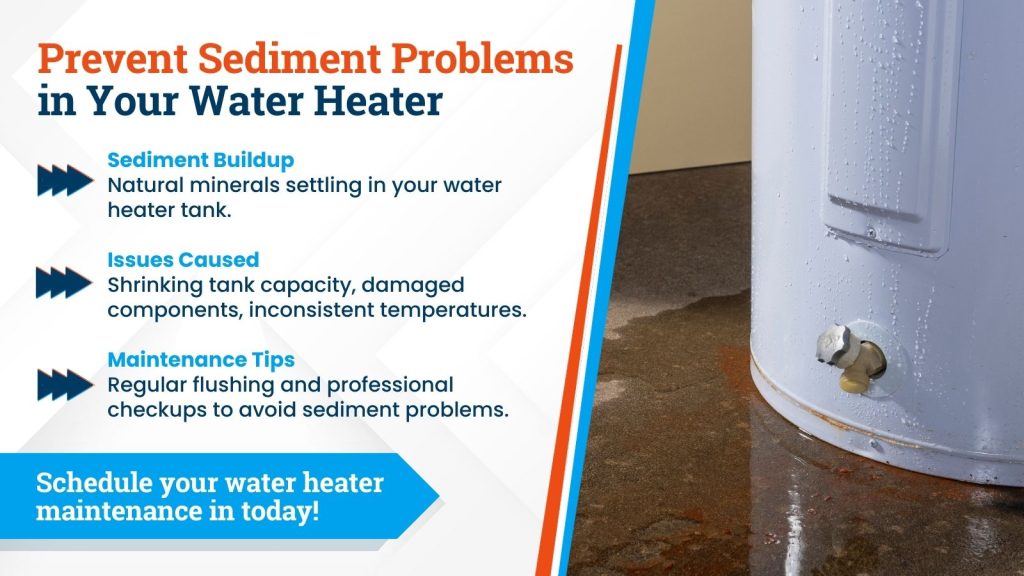Efficiency is the key term of 2025. Many homeowners are looking at the untenable prices of electricity and gas, and they’re looking for ways to reduce the burden on their budget. Well, that’s what this blog is for!
We’ll start by looking at your water heater and discussing ways to remove sediment, which can improve efficiency. Sediment buildup is more common than most homeowners realize and can severely impact performance. Then, we’ll discuss a few extra tips for your heating system this winter to ensure you get proper HVAC efficiency.
Follow these tips for HVAC in Cedar Falls so you can lower your bills as much as possible and feel good knowing you’re using less fuel or energy this year.
How Sediment Buildup Affects Your Water Heater
Your water likely has some minerals or materials in it that settle. Don’t worry, these are perfectly natural and usually don’t change the taste or composition of your water very much. But this changes for your plumbing system–specifically your water heater.
The sediment that settles in your water heater will reduce efficiency and cause serious problems for your budget. They’ll even wear down your water heater until it requires replacement.
- The space in the tank shrinks. As sediment settles in your tank, it does not get flushed out unless you specifically hire a professional to flush your water heater. Our team can do this regularly when you schedule maintenance. However, if sediment is allowed to settle without regular flushing, it will reduce the capacity of your water heater and cause it to provide less hot water.
- The valves and components wear down. As the sediment becomes solid, it can rupture, corrode, and ruin some of your plumbing equipment. If you notice a valve on your water heater being crusted over by limescale or calcium deposits, this is usually due to sediment and it can be a sign that the system is old and needs to be replaced. In many cases, water heater repair or even replacement is necessary to restore proper function.
- The water gets too hot or isn’t hot enough. Sediment will not only reduce the capacity of your hot water heater, but it will also reduce its ability to keep water hot. You might have temperatures that are scalding hot, or water that is just not hot enough. Depending on how bad the problem is, you can schedule an appointment with our team to diagnose the issue and repair it.
Remember, hot water is a necessity for modern living. If you’re experiencing sediment deposits on or around your water heater, or you’re seeing a diminished capacity from your water heater, you may want to take advantage of seasonal savings on repair and maintenance services. Call our team for support.

Simple HVAC Tips to Save Energy
For your heating system, here are a few tips that you can follow to ensure that it lasts until your next maintenance visit or at least the remainder of the season.
- Change the air filter. The air filter can block airflow when it gets clogged with dust. Cleaning this every 1-3 months will ensure that your system runs as efficiently as possible.
- Set moderate temperatures. Your thermostat is going to be your best friend when trying to live more efficiently and reduce the price of utility bills. By setting a moderate temperature during the winter and bundling up (or eating hot foods or yummy soups), you’ll save money regularly.
- Remove snow and ice from exhaust pipes. Make sure your furnace has ample room for exhaust. Not only can a clogged exhaust pipe be a serious health concern, but it can also cause your furnace to shut down completely or run less efficiently.
- Clean the outside of the system. Removing dust and debris from the outside casing of your heating system can actually help it from overheating or running into issues. Allow for 2 feet of clean, unused space around the system at least.
At Dalton Plumbing, Heating, Cooling, Electric and Fireplaces, Inc., your comfort is our promise! To set up an appointment in the Cedar Rapids area, give us a call at the number above, email customerservice@daltonphc.com or schedule an appointment online.

